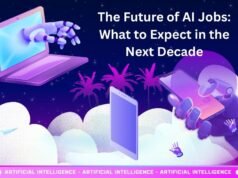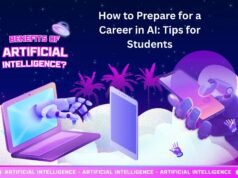Introduction
Artificial Intelligence (AI) is transforming every aspect of modern life, including education and employment. The integration of AI into STEM (Science, Technology, Engineering, and Mathematics) education is crucial in preparing students for future job markets. As automation and AI reshape industries, STEM disciplines must evolve to equip learners with the necessary skills to thrive in a tech-driven world.
The Importance of AI in STEM Education
1. Enhancing Learning Experiences
- AI-powered tools provide personalized learning paths based on student progress and weaknesses.
- Intelligent tutoring systems adapt lessons for individual learners.
- Virtual laboratories and simulations offer hands-on experience in complex scientific and engineering concepts.
2. Developing Critical Skills
- AI and STEM education foster problem-solving, critical thinking, and analytical reasoning.
- Hands-on AI projects enhance computational thinking skills.
- Collaboration with AI enhances creativity and innovation in STEM fields.
3. Bridging the Skill Gap
- AI-related jobs require knowledge of machine learning, data science, and robotics.
- STEM education, integrated with AI, ensures students are equipped with industry-relevant skills.
- Encourages interdisciplinary learning by blending AI with biology, chemistry, physics, and mathematics.
The Role of AI in STEM Fields
1. AI in Science
- AI helps in drug discovery and genomics.
- Predictive analytics in climate change research.
- AI-powered robotic systems assist in space exploration.
2. AI in Technology
- AI enhances cybersecurity through threat detection and prevention.
- Machine learning algorithms improve search engines and recommendation systems.
- AI in software development automates debugging and testing processes.
3. AI in Engineering
- AI optimizes manufacturing processes using predictive maintenance.
- Autonomous vehicles and smart infrastructure developments rely on AI-driven analytics.
- AI-driven automation in construction enhances safety and efficiency.
4. AI in Mathematics
- AI assists in complex mathematical problem-solving.
- AI algorithms are used in data modeling and statistics.
- AI-powered calculators and theorem provers help in advanced mathematical research.
AI-Integrated STEM Education: A Future Perspective
1. AI-Powered Curriculum Design
- AI helps create adaptive and dynamic curricula tailored to students’ needs.
- AI-based assessments provide real-time feedback and progress tracking.
2. Use of Robotics and Automation in Classrooms
- Robotics kits teach students coding, logic, and problem-solving.
- AI-driven chatbots and virtual assistants support student queries.
3. AI and Virtual Reality (VR) in Learning
- VR and AI create immersive learning experiences in STEM subjects.
- AI-enhanced VR simulations help students visualize complex concepts.
4. Online AI-Integrated Learning Platforms
- AI-powered platforms like Coursera, edX, and Khan Academy offer AI-driven STEM courses.
- Personalized learning paths ensure students master concepts at their own pace.
Preparing for AI-Driven Careers
1. Essential Skills for AI-Based Jobs
- Technical Skills: Machine Learning, Data Science, Programming (Python, R, Java, etc.), Neural Networks.
- Soft Skills: Creativity, Critical Thinking, Problem-Solving, Adaptability, Ethical AI Understanding.
- Interdisciplinary Knowledge: Integration of AI in healthcare, finance, engineering, and environmental sciences.
2. Career Opportunities in AI and STEM Fields
- AI Research Scientist – Focuses on developing new AI models and algorithms.
- Data Scientist – Extracts insights from big data using AI.
- Robotics Engineer – Designs AI-driven robotic systems.
- AI Ethics Consultant – Ensures responsible AI deployment.
- STEM Educator with AI Expertise – Prepares students for AI-driven careers.
Challenges in Implementing AI in STEM Education
1. High Costs and Resource Constraints
- AI-integrated education requires advanced tools and high-end computing devices.
- Schools and institutions may struggle with budget limitations.
2. Teacher Training and AI Awareness
- Teachers need continuous training in AI concepts and technologies.
- Lack of AI literacy among educators may hinder effective implementation.
3. Ethical and Privacy Concerns
- AI tools collect student data, raising privacy concerns.
- Bias in AI-driven assessments can impact fair evaluation.
4. Digital Divide
- Unequal access to AI-powered learning tools in underprivileged communities.
- Need for government policies to ensure equitable AI education.
Government and Institutional Initiatives
1. AI Policies and Educational Reforms
- Governments are introducing AI curricula at school and university levels.
- AI-focused scholarships and funding programs for STEM students.
2. AI Research and Development Grants
- Investment in AI research helps develop innovative education technologies.
- Collaboration between universities and tech industries to advance AI education.
3. Public-Private Partnerships
- Tech companies like Google, Microsoft, and IBM offer AI courses and resources.
- AI bootcamps and hackathons encourage hands-on learning experiences.
Future of AI in STEM Education
1. AI-Driven Personalized Education
- AI tutors will provide 24/7 learning support.
- AI algorithms will create customized study plans based on learning patterns.
2. AI-Enabled Global Learning Platforms
- AI translation tools break language barriers in STEM education.
- AI-powered virtual classrooms connect students worldwide.
3. Ethical AI and Responsible Education
- Focus on developing ethical AI frameworks in STEM curricula.
- AI literacy programs to educate students on AI’s societal impact.
Conclusion
The integration of AI into STEM education is essential for preparing students for the jobs of tomorrow. AI enhances personalized learning, bridges skill gaps, and creates new career opportunities. However, challenges like resource constraints, ethical concerns, and digital divides must be addressed. With proper government initiatives, industry collaborations, and continuous technological advancements, AI-powered STEM education will drive future workforce readiness.
Further Reading
- AI for Education – UNESCO
- AI in STEM – MIT Technology Review
- STEM Education and AI – EdSurge
- Future of AI in Jobs – World Economic Forum
- AI Ethics and Education – Harvard University














